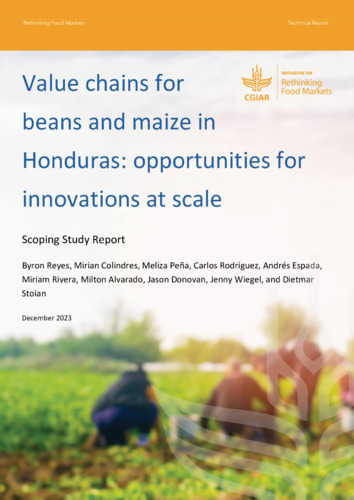Value chains for beans and maize in Honduras: Opportunities for innovations at scale
The Rethinking Food Markets and Value Chains for Inclusion and Sustainability Initiative aims to provide evidence on what types of bundled innovations, incentive structures, and policies are most effective at creating more equitable sharing of income and employment opportunities in growing food markets, while reducing the food sector’s environmental footprint. The Initiative is organized into four working groups (Work Packages-WP). WP2’s work concentrates on identifying opportunities to improve participation and profit of smallholder farmers and agrifood small and medium enterprises (SMEs), and lowering their environmental footprint by identifying, adapting, and scaling interventions in three areas: (i) innovations to improve logistics and create inclusive business models and value chain contracts; (ii) product quality upgrading and food standard certification, and (iii) an enabling policy environment for sustainable development of domestic food value chains. Further, this working group aims to evaluate the effectiveness and synergies between innovations in the domestic chain of common beans and maize, in Honduras, contributing to eliminating the barriers that small producers (including women and young people) face to participate in and benefit from them. To meet its objectives, this group has organized its activities into three stages. During the first stage, interest focuses on knowing the current situation of the value chains in the country, identifying challenges and opportunities to innovate across the different links. In the second stage, a pilot study will be designed and implemented to evaluate innovations identified during the first stage, and that have potential for impact. Finally, in the third stage, scaling strategies will be defined to promote the use of the innovations evaluated and that showed a positive impact. As part of the first stage we designed and implemented a scoping study to identify challenges and innovation opportunities to make bean and maize value chains more inclusive and profitable. This document presents the results of this study, which is a first step to identify innovations that could be evaluated in a future pilot study, together with local partners.

